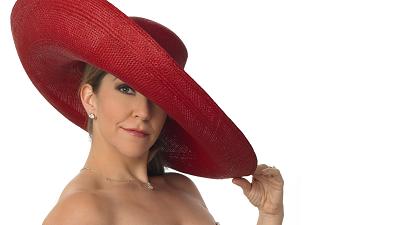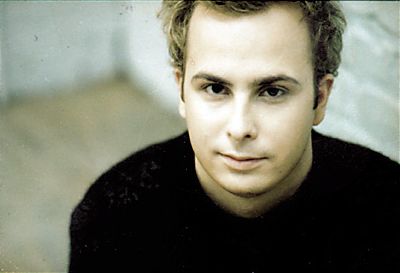I thought that it would be fun to tell you about a little concert last Sunday here in Montréal, with Renée Fleming, Diana Damrau, Joyce DiDonato and Matthew Polenzani. It was actually the first time that I have heard any of them in the flesh, so I was most curious to see if the voices in the house would be as I had imagined in the head.
To get one thing out of the way first; I am not a fan of Ms. Fleming. I find her a vulgar musician – and so there it is. Her voice on this day was responsive and full, up to (but not including high D’s – which were attained with a seemingly different technique and with the grace of God.)
First up was DiDonato (“lauréate du prix Beverly Sills 2007 du Metropolitan Opera de New York”) who gave a highly ornamented “Una voca poco fa.” It was fine as it went, but the hooker-from-an-old-western lace up corset thingy she was wearing was more entertaining yet. The voice was by no means large but it was round and agile. And despite the vocal tinsel all over the place, she had a good idea of how to make this sound like music.Â
Then Renée (“sa fraîcheur et la pureté de son timbre, sa grâce et son intelligence musicale exceptionnelles enchantent sans cesse les auditoires à l’échelle de la planète”) swept on stage in stately diva gait. Cue harp, and I say to myself, “oh, Rusalka!†Easy opening aria for her I think, mostly middle and one Bflat at the end. Well, I had never heard this music back-phrased before! It was truly unmusical, flat and self-regarding. Here, as it was all through the night, she kept her conductor guessing when she was going to move on and sing an actual phrase. Ensemble was often a mess, as it was here. The final B-flat was fine and in tune, but held long enough for her to build a house up there, raise a family and send them off to college. She does have pretty voice though, it must be admitted.Â
Then Polenzani (“reconnu pour la fraîcheur de son lyrisme et la polyvalence de son art, tant au concert qu’à l’opéra”). As a rule, his is not the kind of tenor voice I go for; a little too heady, not enough core to the sound. But he acquitted himself well with a straightforward outing of “Ah, lève-toi soleil!” He mimed the caressing of her cheek, but I managed not to vomit. I do so hate mime.
Next up to bat, Damrau (“très demandée comme interprète de lieder”), who was the reason I wanted to attend this concert. She apparently offered “Je veux vivre,” but I cannot be sure as the few correct words she sang were in the worst French I have heard it quite a while. What was more interesting to me though is that she did not give the impression of a lyric soprano just bursting to emerge. She trod lightly in the middle of her voice and under-sang much of it. The high stuff was enormous and refulgent. But the piece as a whole was more like sight-singing; better to move on.
Fleming again. She was to have sung “Dis-moi que je suis belle!” from Thaïs but it was announced before the concert that she had changed her mind and would instead treat us to the Gavotte from Manon. Ok. Fine. I could live without that piece, but no damage done to my day. She “acted†much of it and the creaminess of her voice occluded her diction. To an audience in Montréal, French is of course not a foreign language. I was surprised to hear her attempt these two high D’s. They were there, but much smaller than the rest of the voice and pinched. The applause was appreciative but underwhelming.
The second half included what turned out to be the best singing of the night, and it came from Mr. Polenzani. He sang an utterly musical, scrupulously phrased “Una furtiva lagrima” – perhaps the best version I have ever heard of this non-showy but difficult aria. That last F “d’amor” is a bitch to come in on piano, and he did a perfect job of it. I think it is telling that he got the second loudest applause of the evening for such an introverted number. In short; it was magic.
Then Diana was back in a form fitting purple tulip velvet number. Yes La Cieca – Jessica Rabbit all over again. She sang “Glitter and Be Gay.” Her English was much better than her sung French but, as is so often the way with “opera” singers who do this, her take was too heavy, to sad, too unvaried, and well, not much fun. Again, she seemed to avoid making to much noise in her middle and saved her efforts for humungous high notes. They are obviously child’s play for her and they are a joy to hear. The spoken section was embarrassing as Cunegonde sounded more like Colonel Klink’s secretary. But people like fireworks and she got huge applause.
Joyce was next with the rondo-finale from Cenerentola. Again, her take was musical but small scale. She didn’t take the cut and sang all three high B’s at the end; but the last of these3 was very iffy as she swelled into it, willing it to creep up to pitch. Third biggest ovation of the evening.
Madame Fleming was now back in an identical dress to the one she wore in the first half– except for its colour. Perhaps she had dyed it during the intermission? Or was there a BOGO sale at her local diva gown outlet? The impression it gave was both tacky and lovely at the same time. She did the Willow Song and “Ave Maria” from Otello, which was the longest stretch of music that evening. What it afforded the audience was a chance to hear all that is good and bad in the art of Ms. Fleming. On the one hand, the tone is gorgeous and full with caramel middle and even tone up to B-flat. On the not so good side, the attack from under the note (pretty much all notes) and resulting flatness is unnerving. The unmotivated and unmusical dipping into raw chest voice when a better mix would lead to a better tone and better phrase. The glottal simpering affect she thinks is effective. I have to admit that the Willow Song came off quite well, but the sobbing she offered in the Ave Maria was jarring and marred what she had built in the first half. The floated last A almost sank. Pinched and more straight tone than not. Perhaps Othello started to strangle this Desdemona ahead of schedule.
The rest of the evening was ensemble, the most successful of which was the Dorabella/Fiordiligi Act I duet. DiDonato and Fleming blended very well and were on musically good behavior. Although not the showiest of numbers, it left me at least wanting to hear the rest of this particular Cosi.
The concert closed with the Rosenkavalier trio, a musical mess with a very nervous looking conductor, Yannick Nézet-Séguin (“Il poursuit sa formation auprès de chefs réputés, notamment, en 1997 et en 1998, le grand maestro italien Carlo Maria Giulini, pour qui il garde une affection et une admiration inspirantes.”)  Fleming was far away on stage from the poor little man and farther away in counting. She wanted to hang onto notes and goddamit she was going to. DiDonato didn’t sound like a natural Octavian, but sounded lovely. Damrau could have been a Sophie who could have obliterated the other voices had she chosen to sing out, but she held all in and still impressed.
So there it is. I at long last hear Fleming in the flesh, and it was pretty much just as I imagined it would be. Lovely if not overly large voice and the kind of musical affectations lesser stars would be shot over. But she is a star. I do not pretend to understand this world. — Chacowhacko





